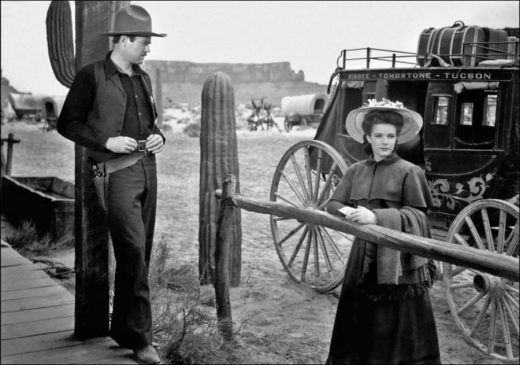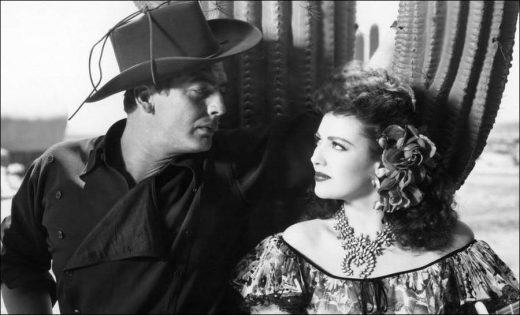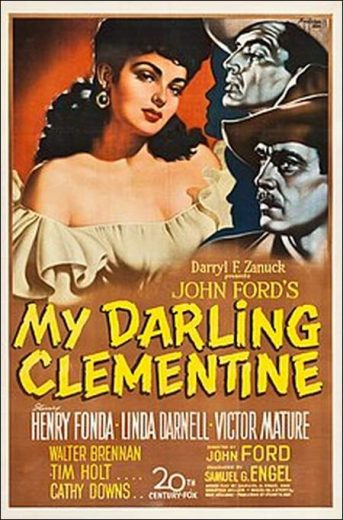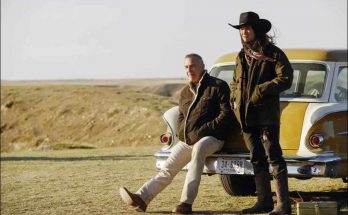My Darling Clementine tells a loose tale of Wyatt Earp (Fonda), who, after his younger brother is murdered by a gang of outlaws outside Tombstone, Arizona, accepts the position of city marshal to get revenge with his other two brothers, Virgil and Morgan.
He reluctantly enters into a partnership with the feared local gambler, Doc Holliday (Victor Mature), and becomes enchanted by the lavish minds of two women, Chihuahua (Linda Darnell) and Clementine (Cathy Downs), the latter being the former lover of Doc. The film leans towards the legendary shooting at the O.K. Corral between Earp and the Clanton Brothers, the cowboys responsible for murdering James Earp and ravaging the family’s livestock.
When all the factual errors are revealed, it only crystallizes the poetic beauty of John Ford’s film. The director’s manipulation of historical accuracy simplifies the narrative so that it can focus on the richer thematic elements commonly found in Ford’s best films, including How Green Was My Valley, The Searchers and The Man Who Shot Liberty Valance.
Film critic David Jenkins, in his supplemental essay for the Criterion Collection, writes that Clementine “eschews any sense of homegrown triumphalism and goes out of her way to suppress anything that might be seen as a glorification of cowpoke tradition.” In other words, Ford’s recognizably revisionism is channeled through the tainted souls perspective, rather than an active re-examination of Western folklore’s skewed relationship to the founding of America and the treatment of Indigenous peoples.
My Darling Clementine was released one year after the conclusion of World War II. The aimlessness of the characters and portrayal of bars and saloons submerged in shadows cast a reflective state of post-WWII cynicism. Wyatt Earp often shouts “What kind of town is this?” in moments of hectic disturbance.
The idyllic towns and cities that Earp is used to encountering as a traveling farmer is a bygone. For Ford, who was a veteran of the war, the angst shared between Earp and Doc Holliday feels personal. While the Earp brothers reside in Tombstone with a mission, a general malaise washes over them, in part due to the decay of the town’s spirit. Holliday, believed to be a figure of reverence among the community, is lonely and insecure. His threatening hostility is an artifice to compensate for his wounded soul.
What Ford understood about stories riddled with darkness and fleeting hope more than any filmmaker is that periodic moments of delicate sweetness broaden the melancholic cloud over the film. This is particularly evident in Wyatt Earp’s budding romance with Clementine, Doc Holliday’s former love interest. Earp expresses an adolescent-like awkwardness when engaging with her.
As an individual who operates solely around men partaking in masculine-associated adventures, he is simultaneously comforted by and apprehensive of a flirtatious relationship. Without any explicit dialogue, viewers can sense that Earp’s affection for her is rooted in a grasp of innocence and romantic bliss amid the threat of violence that he must undergo with the Clanton family.
This feeling is distilled in the scene’s closing moments, as prior to Earp riding off into the open desert following the climactic set-piece of the O.K. Corral gunfight, remarks to himself, “I sure like that name, Clementine.” The line demonstrates an effort on his part to look fondly upon something as sweet as the fruit that shares its name with his love interest.
Visits: 48





